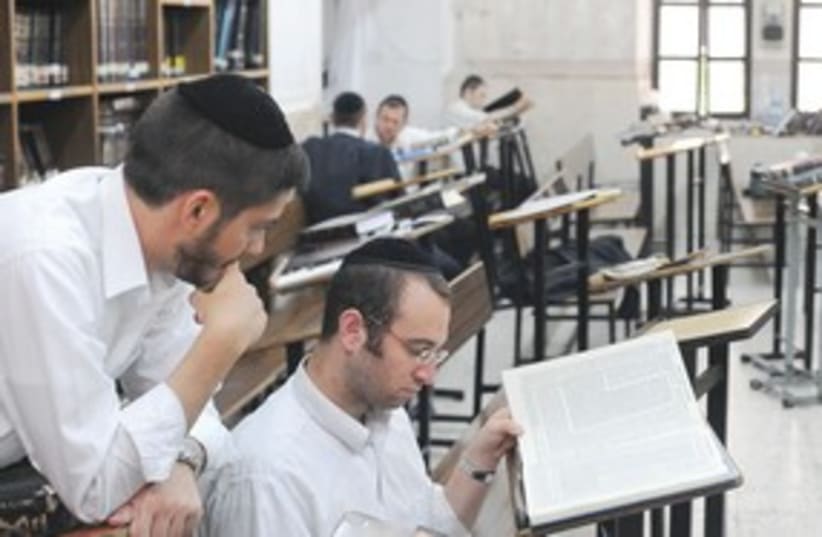RELATED:High Court: Income guarantees to kollel students unlawfulAnalysis: The Right Not to WorkIn a statement released Saturday night, Israel Beteinu announced that they would oppose the bill, saying “not only does the law bluntly discriminate against [university] students in Israel, who serve in the IDF and pay taxes, it eternalizes unemployment…and harms Israel’s economy.”Herzog said he would discuss the bill in the Labor Party ministerial meeting, which precedes Sunday’s committee meeting, and would encourage Labor ministers to vote against it.“If we are taking care of problems and aiding one group, there is no reason to discriminate against other groups,” Herzog said, explaining that university students and single-parent families deserve funding, as well.The new law is sponsored by UTJ, Shas and the National Union, and proposes giving scholarships to kollel students with at least three children and no other source of income.Other conditions for receiving a stipend are that the yeshiva student not own land or a car, and that his wife not work, either.The new law circumvents the Supreme Court's mid-June ruling that put an end to income guarantees to yeshiva students.At the time, the Supreme Court said that such guarantees are discriminatory, because they were not given to university students, as well. The court ruled that they cannot be included in the 2011 budget.The proposed bill points out that the state's budget allows for NIS 450 million in aid for university students, and only NIS 121 million for kollel students.In the explanatory section of the bill, the MKs wrote: "The voice of Torah was not silenced even in the darkest periods in Jewish history, and much of the public sees Torah learning in kollels as promoting the essence of the Jewish people's existence and the guarantee of their eternal continuity."MK Nitzan Horowitz (Meretz) called for ministers to vote against the bill, saying “the government…needs to make a historic decision: Whether to encourage higher education, joining the work force and leaving the cycle of poverty, or to support Judaic studies and eternalizing unemployment in a large part of the haredi population.”Kadima’s spokesperson released the following statement: “Israel’s prime minister faces a test tomorrow, and the public should watch him closely. Tomorrow, Bibi will prove if his political survival is more important to him than the Supreme Court’s decision.”“If Netanyahu bypasses the Supreme Court,” Kadima said, “he is bypassing democracy and deriding the public.”
Herzog, Israel Beiteinu oppose yeshiva student stipends
Bill which aims to circumvent Supreme Court ruling that ended funding for full-time students of Torah set to be discussed in legislative c'tee; derided as "discriminatory" and "harmful to Israel's economy."

RELATED:High Court: Income guarantees to kollel students unlawfulAnalysis: The Right Not to WorkIn a statement released Saturday night, Israel Beteinu announced that they would oppose the bill, saying “not only does the law bluntly discriminate against [university] students in Israel, who serve in the IDF and pay taxes, it eternalizes unemployment…and harms Israel’s economy.”Herzog said he would discuss the bill in the Labor Party ministerial meeting, which precedes Sunday’s committee meeting, and would encourage Labor ministers to vote against it.“If we are taking care of problems and aiding one group, there is no reason to discriminate against other groups,” Herzog said, explaining that university students and single-parent families deserve funding, as well.The new law is sponsored by UTJ, Shas and the National Union, and proposes giving scholarships to kollel students with at least three children and no other source of income.Other conditions for receiving a stipend are that the yeshiva student not own land or a car, and that his wife not work, either.The new law circumvents the Supreme Court's mid-June ruling that put an end to income guarantees to yeshiva students.At the time, the Supreme Court said that such guarantees are discriminatory, because they were not given to university students, as well. The court ruled that they cannot be included in the 2011 budget.The proposed bill points out that the state's budget allows for NIS 450 million in aid for university students, and only NIS 121 million for kollel students.In the explanatory section of the bill, the MKs wrote: "The voice of Torah was not silenced even in the darkest periods in Jewish history, and much of the public sees Torah learning in kollels as promoting the essence of the Jewish people's existence and the guarantee of their eternal continuity."MK Nitzan Horowitz (Meretz) called for ministers to vote against the bill, saying “the government…needs to make a historic decision: Whether to encourage higher education, joining the work force and leaving the cycle of poverty, or to support Judaic studies and eternalizing unemployment in a large part of the haredi population.”Kadima’s spokesperson released the following statement: “Israel’s prime minister faces a test tomorrow, and the public should watch him closely. Tomorrow, Bibi will prove if his political survival is more important to him than the Supreme Court’s decision.”“If Netanyahu bypasses the Supreme Court,” Kadima said, “he is bypassing democracy and deriding the public.”